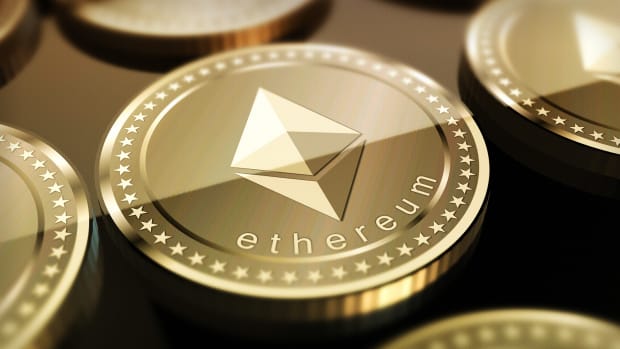In 2013, a computer programer named Vitalik Buterin published a white paper entitled "A Next Generation Smart Contract & Decentralized Application Platform."
The title may not be particularly catchy, but that white paper introduced ethereum and now ether, its native token.
Most often people use Ethereum to talk about Ether. Ethereum is the underlying technology, while Ether is the platform-bound token. This is the principle of most crypto projects: They are always accompanied by a native token.
Ether is now the second-largest cryptocurrency in the world behind bitcoin.

Shutterstock
Where Does The Name Ethereum Come From?
In addition to Buterin, other founders include Gavin Wood, Charles Hoskinson, Anthony Di Iorio and Joseph Lubin.
Ethereum was announced at the North American Bitcoin Conference in Miami, in January 2014 and development work began that same year. The network went live on July 30, 2015.
Ether has increased in price from $0.311 at its launch to around $4,878.26 at its highest on November 10 last year. Ether currently trades at to $3.117.01, according to CoinGecko.com.
Buterin, who recently appear on the cover of Time Magazine, said he chose the name ethereum after browsing a list of elements from science fiction on Wikipedia, noting that the word "ether" refers "to the hypothetical invisible medium that permeates the universe and allows light to travel."

Shutterstock
Why Ethereum Is Important?
The Ethereum blockchain is a platform that allows the development of apps related to decentralized finance (DeFi).
These DeFi projects want to remove middlemen in the financial services industry. Basically, DeFi apps want to enable peer-to-peer transactions. For example in a loan transaction, there would no longer be a bank to act as intermediaries between borrowers and lenders. All this is replaced by smart contracts.
A smart contract is a piece of computer code that determines the terms of a transaction (loans, trading, etc.) and don't rely on any third party. Things are done automatically and follow the rules that people have agreed on.
There is no centralized authority like a bank that could suspend or cancel the transaction.
Ethereum also allows for the creation and exchange of NFTs, or non-fungible tokens.
Ethereum Is Used By Its Competitors
Many other cryptocurrencies operate as ERC-20 tokens on top of the Ethereum blockchain and have used the platform for initial coin offerings.
In March 2021, Visa (V) announced that it began selling stablecoin transaction using ethereum and a month later JP Morgan Chase (JPM) said they were investing $65 million into ConsenSys, a software development firm that builds ethereum infrastructure.
There were two network upgrades last year. The first was the "Berlin" upgrade on April 14 and the second was the "London" upgrade on August 5.
The London upgrade included Ethereum Improvement Proposal ("EIP") 1559, which introduced a mechanism for reducing transaction fee volatility.
The crypto is in the final stages of Eth 2.0, an upgrade to the ethereum blockchain that looks to increase ethereum's capacity for transactions, reduce fees and make the network more sustainable.







